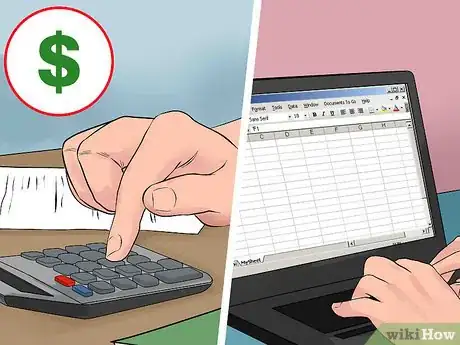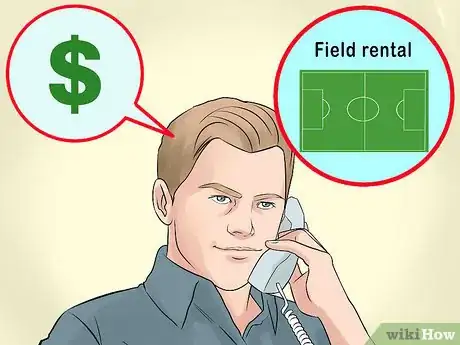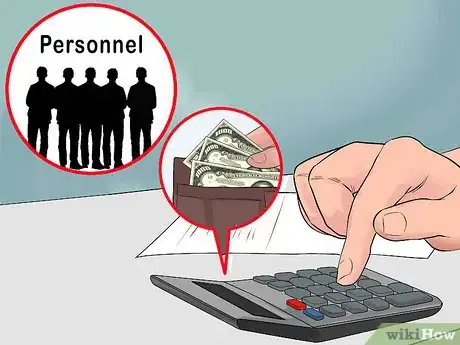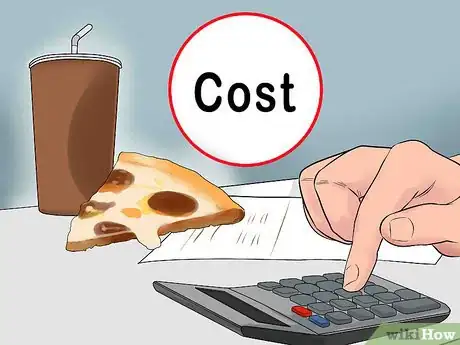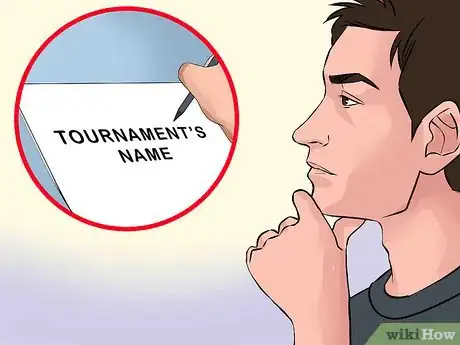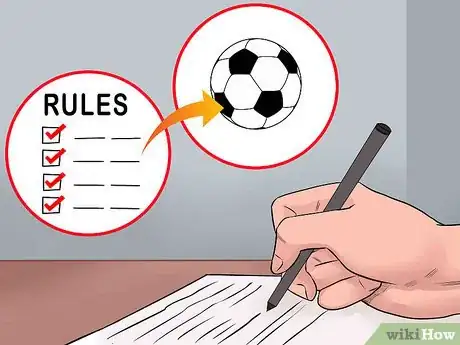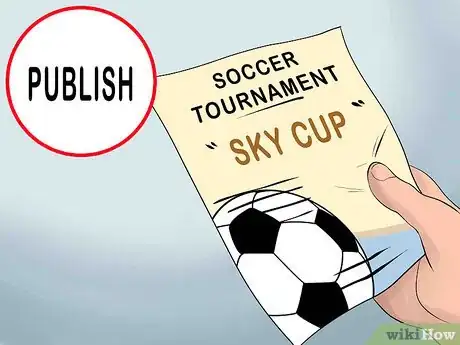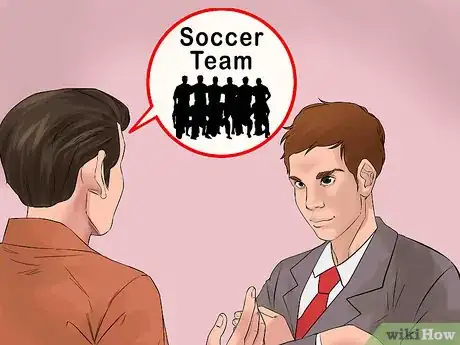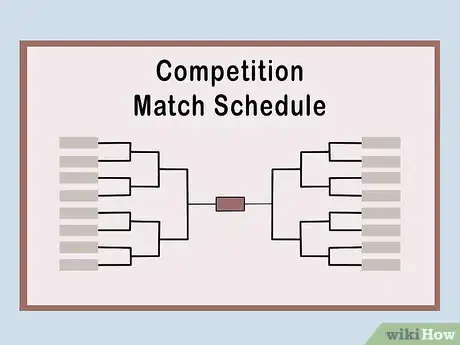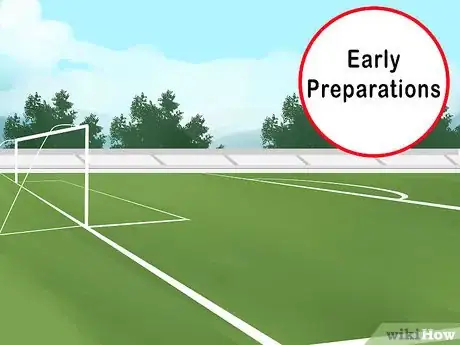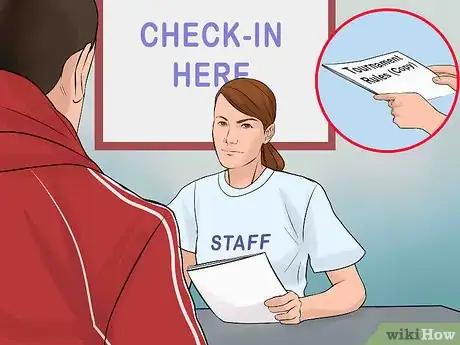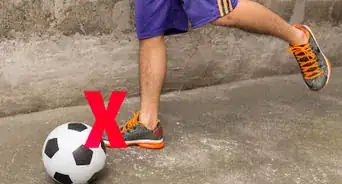This article was co-authored by wikiHow staff writer, Danielle Blinka, MA, MPA. Danielle Blinka is a Writer, Editor, Podcaster, Improv Performer, and Artist currently living in Houston, TX. She also has experience teaching English and writing to others. Danielle holds a Bachelor of Arts in English, Bachelor of Arts in Political Science, Master of Arts in English with a concentration in writing, and Master of Public Administration from Lamar University.
wikiHow marks an article as reader-approved once it receives enough positive feedback. In this case, 91% of readers who voted found the article helpful, earning it our reader-approved status.
This article has been viewed 173,122 times.
Learn more...
Hosting a soccer tournament can be a great fundraiser or promotional event for your organization, as well as a fun opportunity for local soccer teams. If you want your tournament to be successful, it needs to be well-planned and professional. While holding your own tournament is a ton of work, it’s also rewarding. To organize your soccer tournament, you’ll need to budget for your event, find a good location, establish your tournament, attract teams, and host your tournament.
Steps
Budgeting For Your Event
-
1Prepare an expense plan. You can use a spreadsheet or just make a list that helps you keep track of your tournament expenses. You need to have written documentation for your tournament costs so that you can keep your finances organized and easily explain the costs to your funding sources. Insert all of your figures into a spreadsheet, including a contingency fund. Calculate a total cost for the tournament so that you can plan how to fund it.
- Try an Excel spreadsheet for easy calculations.
- Try Google sheets that you can access from any device, making it easier to input expenses from your phone.
-
2Find out the market rates of rental facilities. You need to have a general idea of how much it will cost to rent fields for your tournament. Contact your local government, schools, and athletic clubs to ask about available fields and the rental costs. Insert the number range on your spreadsheet.
- While you're asking about costs, consider getting information about rules and policies.
Advertisement -
3Get an estimate for trophy costs. Your tournament will need trophies, so contact local shops that sell them or go online. You will need to decide if you want to give participation trophies or just rank trophies. Estimate the number of trophies by multiplying the projected number of teams by the average number of team members.[1]
- Your anticipated number of teams for budget purposes should be the most you can accommodate or the number of teams in your area if you're keeping it local.
-
4Calculate the cost of hiring personnel. You will need referees, concession stand operators, security, cleaning crew, and people to help during game transitions. Ask other local organizers for rates they pay or go online for a pay range.
- Consider asking for volunteers to referee, clean up, or work the concession stand. You may be able to make it a condition for entering the festival that the team provides a certain number of parent volunteers during times the teams are not playing.
-
5Determine concessions costs. A concession stand can bring in a lot of money for your organization, but you need to supply it with snacks and drinks. Calculate these costs and any related costs, such as renting a booth or table.
- Remember to ask about permits and codes if you plan to cook food in the concession stand.
- Consider ordering pre-made food such as pizza, and include that expense in your budget.
-
6Look for sponsors. Sponsors can offset a lot of your costs if you’re willing to promote other organizations or events. You may even be able to partner with another organization to share the costs and the proceeds. Make sure that you get any sponsorship deals in writing and fulfill your side of the bargain.
- You may be able to sell advertisements as a form of partnership. These ads can be placed on t-shirts, signs, or promotional materials that you use to advertise the tournament. Consider placing signs around the edges of the field.
Finding a Good Location
-
1Choose a date. Before you can book your venue, you’ll need to choose a date so that you can make sure that the location you want is available on the day or weekend you plan to host the tournament. Your tournament should not conflict with other tournaments, and it will probably attract more established teams if you choose a date during the normal soccer season in your region.
- You may need to have your tournament over a weekend, depending on how many fields you have and how many teams you plan to accommodate. Make sure that you budget enough time for games.
-
2Find an available field. Your tournament will need to allow for at least one playing field, though more fields will allow for more teams to enter. Refer to the list of fields you called during budgeting to choose the best one.[2]
- Call local facilities, particularly those that already host soccer games.
- Consider how many teams will be playing in your tournament to help you find your field needs.
- You may be able to get the field for free as a sponsorship opportunity. For example, a local school may allow you to use their field if you promote them as a sponsor.
-
3Make sure that your field has seating. Your tournament will draw spectators who will want a comfortable means of watching the teams play. Don’t count on your spectators to bring their own seating. You need to choose a field that has seating, such as stands.[3]
-
4Check for adequate bathrooms. The field you choose should have nearby bathrooms. If you think that you won’t have enough bathrooms to accommodate your event, consider renting porta potties.
- You may also want to provide changing facilities.[4]
-
5Ask about the requirements to use the field. You will likely need to purchase insurance for your tournament’s use of the field, so ask the field owner how much insurance you will need to purchase. You also need to find out what you need to do to prepare the field and clean it after the tournament.[5]
Establishing Your Tournament
-
1Name your tournament. Choose a name that will attract attention and tell people what kind of tournament it is. Depending on the size of your area or the type of your organization, you may want to include the area’s or organization’s name in the tournament. Teams are more likely to want to participate in a tournament that sounds elite or like it’s for a good cause, so keep that in mind.
- For example, if you are raising money for something like a charity or school playground, you could call your tournament “St. Marks Playground Benefit Soccer Tournament.”
- Alternatively, a tournament in a large area could be called “Uniting Houston Soccer Tournament.”
- If you want to try something fun, you could name it “Just for Kicks Soccer Tournament.”
- An elite tournament name could be “Bay City Cup Soccer Tournament.”
-
2Recruit volunteers. Using volunteers will allow you to collect more proceeds since you won’t have to hire as much staff. Contact local colleges and civic organizations to look for volunteers to help with refereeing matches, serving concessions, picking up trash, providing directions to guests, monitoring the area, reminding people of the rules, and other basic duties.
- If you plan to require teams to supply volunteers, consider that when recruiting.
- It’s better to have too many volunteers than too few.
- Don’t use volunteers for security unless they work in law enforcement or security. Instead, rent a few security officers by the hour.
-
3Set tournament rules. By setting rules, you can make sure that you fulfill the obligations that you agreed to when renting the field, such as keeping it clean and not destroying the turf. You can also set standards for good sportsmanship and protect yourself in case of an incident. For example, having established rules can allow you to remove someone who is behaving inappropriately.[6]
- Example rules include: No littering, no hitting, no profanity, no altering of facility property, and no food on the field.
-
4Contact local police and fire departments. Make sure that the authorities know about your tournament in case there’s an emergency. You can also ask them if they have any recommendations to keep your tournament safe or if there are any laws that you may not be aware of relating to tournaments like yours.[7]
- You may want to hire off-duty police officers to serve as your security personnel.
Getting Teams to Play Your Tournament
-
1Advertise your tournament. Tell the public about your tournament by posting signs or ads about your tournament. Ask local clubs and schools if you can include your tournament in their newsletter or if you can post the information in a location where soccer players or coaches will see it. Be sure to provide details on how to register the teams, such as your email contact and telephone number.
- Hang fliers in local sporting good stores or near athletic clubs.
- Publish ads in the newspaper and on local internet sites.
-
2Call local soccer organizations. Go to where the teams are to tell them about your tournament. If your area doesn’t have a local soccer organization, call the local athletic clubs or little league organizations, depending on your target age group.
-
3Organize your own teams. If your area doesn’t have established teams, you can still have a tournament if you encourage the community to create their own teams just for your tournament. This can work especially well for adults since many adults enjoyed playing sports as youths but no longer get to play on organized teams as adults. Teams can be built around workplaces, churches, and social groups.
-
4Register teams. Have each team provide registration details, including the team name, a team contact, and a roster of players. If your tournament is ordering t-shirts, it’s a good idea to have players submit their sizes during registration to make it easier to distribute shirts during the tournament. You can register teams by email or via a website that specializes in registrations.
- Ask teams to pay all or part of the entry fee at registration so that teams don’t back out.
- Get a team roster so that you know how many trophies to order.
- Get t-shirt sizes so that you can create a bundle for each team, making it easier to distribute the shirts at check-in.
Hosting Your Soccer Tournament
-
1Create a schedule. After registrations are in, build a schedule and tournament bracket that allows each team proper play. Make sure that you have enough time for each game, as well as time to clean up between matches. When you finalize the schedule, make copies so that each team will have access to it on the day or weekend of the tournament.
-
2Purchase supplies. Wait to buy supplies until after you have an idea about how many teams will participate. Supplies will include trophies, concessions food, signs, check-in materials, and t-shirts if you have them. You may need to order food in advance, so contact your supplier to find out what you need to do to be ready on tournament day.
-
3Set up the field in advance. To be professional, your tournament should be ready to go before participants start to arrive. Go out to the field the day before to make sure that the facility looks good and then get to the field early in the morning to set up the check in table and concessions stands.
- Tell your volunteers the exact time that they should arrive so that they don’t assume that it’s at the start of the tournament. Otherwise, you may be setting up alone.
-
4Assign all volunteers a specific duty. Your volunteers need to know what their job is and how to properly do it. While some can do double-duty, don’t just expect your volunteers to do every job. Set them times to be on duty and where they should be working.
- For example, a volunteer assignment could be 1 pm-3 pm in the concession stand or 8 am-10 am providing directions near the entrance.
-
5Check in the teams at a designated location. A team representative should be expected to come check in with you or your tournament staff. Put the check-in location in a central area, such as near the gates to the field or where most people enter the field from the parking lot. Provide a copy of the tournament rules, the playing schedule, and a map to each team representative.
- Try using a table or booth to make the check-in area more noticeable.
- If your tournament has t-shirts, you can distribute shirts during check-in. Bundle the shirts by team name, and then you can hand each bundle to the team’s representative.
Community Q&A
-
QuestionHow do I ask for sponsorship?
 Community AnswerTalk to businesses in your local area that may be interested and tell them why it is important to have their support and how they will benefit from offering it.
Community AnswerTalk to businesses in your local area that may be interested and tell them why it is important to have their support and how they will benefit from offering it. -
QuestionHow can I make fair teams for the tournament?
 Community AnswerIdentify the marquee players and distribute them among different teams.Then go on with the bidding process by assigning a fixed amount per team.
Community AnswerIdentify the marquee players and distribute them among different teams.Then go on with the bidding process by assigning a fixed amount per team. -
QuestionWhat are the responsibilities of the host for an international soccer tournament?
 Community AnswerThe host will coordinate the entire tournament.
Community AnswerThe host will coordinate the entire tournament.
References
- ↑ http://www.globalteamevents.com/how-to-organize-youth-soccer-tournaments/
- ↑ http://www.globalteamevents.com/how-to-organize-youth-soccer-tournaments/
- ↑ http://www.globalteamevents.com/how-to-organize-youth-soccer-tournaments/
- ↑ http://www.rewarding-fundraising-ideas.com/soccer-fundraiser.html
- ↑ http://www.globalteamevents.com/how-to-organize-youth-soccer-tournaments/
- ↑ http://www.globalteamevents.com/how-to-organize-youth-soccer-tournaments/
- ↑ http://www.globalteamevents.com/how-to-organize-youth-soccer-tournaments/
About This Article
To organize a soccer tournament, start by budgeting for your event by finding out how much it will cost to rent fields, buy trophies, hire personnel, and provide food. Next, look for sponsors to offset the costs in exchange for promotion of their organization. Once you have the finances workout out, decide on a date that doesn't conflict with other major events, and find an available field. Then, choose a name for your tournament that will attract attention, recruit volunteers, and set the tournament rules. To learn how to get teams to play in your tournament, keep reading!
